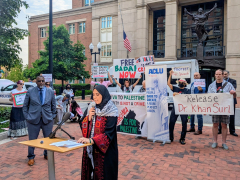Alexandria, Virginia – “Free him now. Free him now.”
Those words rang outside a federal courthouse near Washington, DC, on Thursday, as lawyers argued over the case of Badar Khan Suri, who has been detained by the United States government over his support for Palestinian rights.
Dozens of activists had gathered to show solidarity with Khan Suri, a postdoctoral scholar at Georgetown University. He was arrested in March as part of President Donald Trump’s campaign to punish and deport non-citizens accused of fuelling “anti-Semitism” and “illegal protests” on college campuses.
Speaking to the crowd in Alexandria, Virginia, Mapheze Saleh – Khan Suri’s Palestinian American wife – highlighted the impact of his detention on their three children. She said they just wanted their father back.
“Why is this happening to him? Why is the Trump administration persecuting him?” Saleh said. “Because he fell in love and married to a Palestinian, because he dared to express his belief in non-violence and because he spoke out bravely against the genocide of my people in Gaza.”
Before his detention, Khan Suri was in the US on an academic visa, conducting research on peace-building in Iraq and Afghanistan.
But the US government has accused Khan Suri, an Indian national, of violating the terms of his visa by “actively spreading Hamas propaganda and promoting antisemitism on social media”. It has not offered proof of either assertion.
Outside the courthouse on Thursday, Amanda Eisenhour, an activist from Alexandria, said Khan Suri’s case represents the intersection of issues including free speech, constitutional rights and the “tyranny” of the US immigration system.
“It’s also about Palestine,” Eisenhour told Al Jazeera. “I want to make sure that’s always part of the conversation. Dr Khan Suri is a political prisoner because of his association, because of his marriage to somebody who’s Palestinian. We’re now a country that holds political prisoners, and we have to be ready to fight against that.”
As the legal hearing unfolded, activists outside chanted for Khan Suri’s freedom and Palestinian rights under a statue of a blindfolded woman holding scales, symbolising justice without bias.
One protester held up a sign, “Mob bosses disappear people.” Another placard proclaimed, “Due process now.”
A case in Virginia, a client in Texas
In the courtroom, lawyers for both sides questioned the geographical divide between where the hearing was taking place – and where Khan Suri is held presently.
After his arrest in Virginia, immigration officials quickly moved Khan Suri from a local detention centre to one in Louisiana and then in Texas.
Critics say the government has transferred individuals slated for deportation to faraway states to keep them away from their families and legal teams. They also point out that states like Louisiana and Texas are more likely to have conservative-leaning courts.
On Thursday, Khan Suri’s lawyers argued for the scholar to be moved back to his home state of Virginia, where his case is currently unfolding.
“We hope the court sees through these unlawful government tactics, keeps Dr Suri’s case here in Virginia, orders that he be released or, at minimum, orders that he be returned to Virginia, where he’ll be close to his legal counsel and to his family,” said Samah Sisay, staff lawyer at the Center for Constitutional Rights, which is involved in the case.
But the Trump administration made an opposing request, pushing for the court case to be transferred to Texas.
Ultimately, Judge Patricia Tolliver Giles demanded answers about why Khan Suri was moved so swiftly out of Virginia. She gave the government’s lawyers 24 hours to respond.
The Georgetown scholar’s lawyers have reason to be optimistic about the outcome. Federal district courts have asserted jurisdiction in similar cases, and on Wednesday, a judge in Vermont ordered the release of Columbia University student Mohsen Mahdawi, who is also facing deportation.
‘That’s not the America we want to be’
Since Trump began his second term in January, Secretary of State Marco Rubio has suggested that he revoked the visas of hundreds of foreign students who engaged in protests or criticism of Israel.
But the push to deport Khan Suri has been one of the most prominent cases.
To justify removing Khan Suri and other student activists, Rubio has cite





